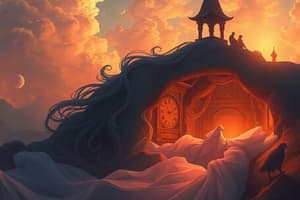Podcast
Questions and Answers
What key aspects did Romanticism emphasize in reaction to neoclassicism?
What key aspects did Romanticism emphasize in reaction to neoclassicism?
- Emotion and individualism (correct)
- Progress and industrialization
- Tradition and collective norms
- Rationality and strict forms
Which historical event significantly influenced the emergence of the Romantic Period?
Which historical event significantly influenced the emergence of the Romantic Period?
- The Industrial Revolution (correct)
- The American Revolution
- The Enlightenment
- The Renaissance
What role does nature play in Romantic literature?
What role does nature play in Romantic literature?
- An insignificant theme in literature
- A tool for scientific exploration
- A symbol of freedom and beauty (correct)
- A backdrop for urban settings
How did Romantic writers prioritize emotion in their literary works?
How did Romantic writers prioritize emotion in their literary works?
What is the concept of the sublime in Romantic literature?
What is the concept of the sublime in Romantic literature?
Flashcards
Romanticism
Romanticism
A literary movement that emerged in the late 18th century, emphasizing emotion, individualism, and nature.
Industrial Revolution
Industrial Revolution
A period of rapid technological and social change, marked by industrialization, that significantly influenced the Romantic movement.
The Sublime
The Sublime
A literary technique used by Romantic writers emphasizing the awe-inspiring aspects of nature, eliciting feelings of wonder and terror in readers.
Emotion in Romantic Literature
Emotion in Romantic Literature
Signup and view all the flashcards
Supernatural Elements in Romantic Literature
Supernatural Elements in Romantic Literature
Signup and view all the flashcards
Study Notes
Romanticism Overview
- Romanticism emerged in the late 18th century as a reaction against Neoclassicism.
- It emphasized emotion, individualism, and nature.
- This movement significantly influenced literature.
Historical Context
- The Romantic Period occurred during major social and political upheavals.
- The Industrial Revolution and the French Revolution influenced writers.
- Disillusionment with reason led writers to focus on emotions and the sublime.
Key Characteristics
- Romantic literature centered on emotion, imagination, and the individual.
- Themes included nature, the supernatural, and the sublime.
- This challenged the rationalism of the Enlightenment.
- Personal experiences were highlighted.
Major Authors
- Key figures include William Wordsworth, Samuel Taylor Coleridge, and Lord Byron.
- Each contributed unique styles and perspectives to the movement.
- Their work influenced subsequent literary generations.
Themes of Nature
- Nature was a central symbol in Romantic literature.
- It often represented freedom, beauty, and truth.
- Natural imagery was used to portray complex societal critique and emotions.
- A reverence for the natural world was apparent.
The Role of Emotion
- Emotion was central to Romantic literature.
- Feeling was prioritized over reason.
- This subjectivity created strong author-reader connections.
- Deeper emotional experiences were a significant aspect.
Supernatural Elements
- Romantic literature often incorporated supernatural elements.
- This reflected a fascination with the mysterious and unknown.
- These themes explored human understanding and experience.
The Sublime Experience
- The sublime was a crucial theme in Romantic literature.
- It represented awe-inspiring beauty beyond ordinary experience.
- Writers aimed to evoke feelings of wonder and terror.
- Confronting the vastness of existence was emphasized.
Influence on Later Literature
- The Romantic Period laid the groundwork for later literary movements.
- Realism and Modernism are examples.
- The focus on emotional experiences and individual experience resonates today.
Critical Reception
- Romantic literature faced criticism for perceived excesses and emotionalism.
- However, its cultural importance and effect on modern thought led to reevaluation.
- Its impact on the literary canon has evolved.
Legacy of Romanticism
- The legacy of Romanticism is evident in various art forms.
- Ideals of individualism and self-expression continue to inspire artists and writers.
Conclusion
- Romanticism marks a profound shift in literary tradition.
- Its emphasis on emotion, nature, and the individual impacted literature and art.
- Romanticism's legacy reflects the complexities of the human experience.
Studying That Suits You
Use AI to generate personalized quizzes and flashcards to suit your learning preferences.




